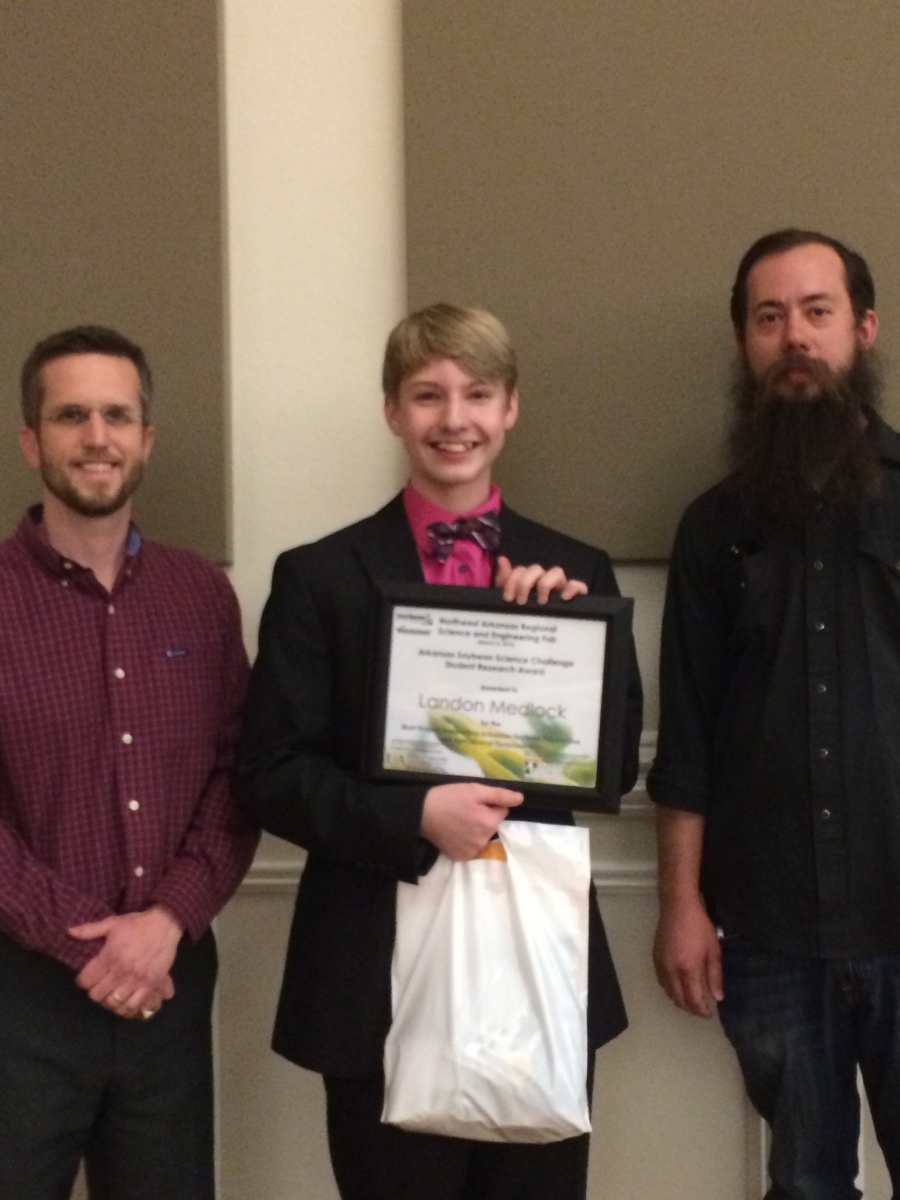Landon Medlock

Landon Medlock wins Arkansas Soybean Science Challenge Award at 2016 Northwest Arkansas Regional Science and Engineering Fair
Landon Medlock, 14, an Alma High School 9th grader, won the Soybean Science Challenge $300 cash award in the regional round of the Northwest Arkansas Science and Engineering Fair on March 4.
The cash award was provided by the Arkansas Soybean Promotion Board and presented by Dr. Julie Robinson, Soybean Science Challenge judging coordinator for the fair.
Medlock’s science project tested the strength of Eddy currents in various materials such as a PVC, copper, aluminum and stainless steel tubes. Medlock believes his experiment can be adapted to test the effect of different types of magnetism on plant growth, specifically soybeans.
“I was very excited when it was announced that I was the winner,” he said. “I hoped after all the research I did that I could win the challenge. Winning my regional contest has given me the chance to compete at the state level and present my research and ideas once again.”
Medlock did not know much about Arkansas soybeans before he participated in The Challenge. “I knew it was one of the main crops grown in Arkansas and that it was used in different foods. I had heard of the soybean hybrid, edamame, because I live close to Mulberry, known as the edamame capital of the world. But, I was unaware that it had anything to do with soybeans.”
The part of the Soybean Science Challenge online course which appealed most to Medlock was the chance to share ideas on how to improve the Arkansas agricultural industry. He enjoyed completing the modules. “One of the things I found very interesting was that soy is used in so many everyday products like crayons and more importantly biodiesel.”
Carole Medlock, Landon’s mother, said she and his dad were so excited when we learned that Landon had won the Soybean Science Challenge. From the time Landon found out about the opportunity to compete for this special award, he worked very hard to research how his project on magnetism could have an effect on the sustainability of Arkansas soybeans.
Medlock’s older brother had a positive influence on him as a youngster. The brothers are almost ten years apart so before Medlock was ever in school he saw his brother as a sixth grader already competing in science fairs. “Landon lived in a home where the dining room table was the staging area for a science fair project more often than not. I think he really looked forward to the day he was old enough to conduct experiments of his own,” said Carole Medlock.
Medlock plans to enter the Soybean Science Challenge again since as a 9th grader he will have more opportunities to participate in regional and state science fairs. “After conducting my research this
year, I am excited about the possibility of a project next year that would test the effect of different types of magnetism on plant growth, including soybeans.”
“I gained so much knowledge about the Arkansas agricultural system and a new appreciation for how many consumer goods contain soybeans.” Medlock said about his participation in the Soybean Science Challenge.
Medlock’s mother, Carole, said, “Landon participates in fun and extracurricular activities, but that even with all of the “extras” he has not lost sight of the fact that academics come first.” As parents, we have been “impressed with Landon’s dedication to academics this year. He enjoyed completing the modules and worked very hard to make his project competitive, so as his parents, we were pleased to see that hard work rewarded.”
“The Arkansas Soybean Science Challenge Award program is in its third year partnership between the Arkansas Soybean Promotion Board and the University of Arkansas Division of AgricultureCooperative Extension Service,” said Dr. Karen Ballard, director and developer of the program.
Engaging and rewarding students in real-world educational research that supports the Arkansas soybean industry and agricultural sustainability is the goal of The Challenge which opened in 2014 to 912 grade Arkansas science students. Students who successfully completed the online course were eligible to have their original soybean-related projects judged at the 2016 ISEF-affiliated Arkansas science and engineering fairs.
For more information on the Soybean Science Challenge, contact Dr. Karen Ballard at (501) 6712086 or kballard@uaex.edu.
Landon Medlock – Arkansas Soybean Science Challenge Regional Winner – 2016 Northwest Arkansas Science and Engineering Fair
Project Title: Testing the Strength of Eddy Currents
Abstract: My experiment was testing the strength of Eddy currents in various materials. The hypothesis for the experiment was that a pipe made of copper would conduct the most Eddy currents, therefore causing a magnet dropped down the copper tube to travel the slowest. In addition, it was believed that a PVC pipe would conduct little or no Eddy currents; therefore it would take the least amount of time for a magnet to fall through the tube. To complete the experiment I set up a Photogate laser timer on a wooden support stand; set up a PVC vertical and lined up with the timer; dropped a neodymium magnet down the PVC tube; the timer displayed the time it took and that was recorded on the data table; the magnet was dropped two more times to provide an average. The previous steps were repeated for the copper, aluminum, and stainless steel tubes.
The data recorded supported the hypothesis. The copper tube had the longest recorded average time, while the PVC had the shortest recorded average time, leaving the aluminum tube to have the middle average time of the four. The results for the stainless steel tubing were inconclusive because the magnetic attraction was too great and the magnet could not be dropped down the tube. Instead the magnet adhered to the side. In conclusion the hypothesis was correct, the copper took the longest and the PVC took the shortest amount of time.

Left to right: David Moseley, Program Associate, Crop Soil & Environmental Sciences department., Landon Medlock and Jonathan Smith, University o f Arkansas graduate student, Plant Pathology department.
